Content created: 2011-09-29
File last modified:
Hebrew Tales
Jonah & the Great Fish
The Book of Jonah
Dramatis Personae
- Jonah (יוֹנָה) = an effective prophet but not entirely clear on the concept
- The Lord God = an independent-minded manager of human destinies
- A Great Fish = an instrument of Jonah's reclamation
Procursus
The tiny Book of Jonah, of unknown authorship, is canonical for both Christians and Jews, and is one of the shortest biblical books. (Obadiah is slightly shorter.) Its unknown author seems to have written it down sometime in the 400s BC, but the story is set three centuries earlier in the days of the second King Jeroboam in the 700s BC, when there actually lived a little-known prophet named Jonah (mentioned in II Kings 14:24, and in Tobit 14:4 and 14:8 —Link) with whom the story is associated. (News Note)
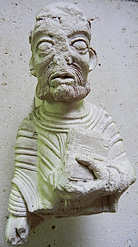
The tale caught the imagination of early storytellers and artists from that time to our own, and museums are full of pictures of Jonah and the Great Fish.
As the scene opens, the Lord God has decided that the city of Nineveh, the capital of Assyria (modern Mosul, Iraq), is full of wickedness and needs to be destroyed. Nineveh was a traditional enemy of Israel and the seat of various rulers who sought dominance over everybody around them, so a fifth-century Jewish listener would have found the Lord God’s plan both reasonable and laudable. (Other, older Hebrew texts represent God threatening such projects and sometimes carrying out his threats, after all.)
The Lord God decides to allow Nineveh a chance to repent and avoid destruction, however, so he directs Jonah, a prophet —listed in later Jewish tradition as one of the "minor" prophets— to go to the city with the ultimatum. Jonah has no use for Nineveh, and would rather just let it be destroyed, which everybody knows it richly deserves, so he heads to sea rather than to Nineveh.
Jonah’s unwillingness to take on this mission to offer a chance of survival to the hated Ninevites is what ends him up in the belly of the Great Fish so beloved of European painters, sculptors, and book illustrators clear up to the present. (Some of them go way beyond "fish." The Roman period sculpture illustrating chapter 3, below, has wings, the feet of a lion, and the head of a wild boar.) Worse yet, from Jonah's perspective, he is barfed up from the fish's belly only slightly the worse for wear, back on square one, and still ordered to go to Nineveh. It clearly is not easy being a prophet.
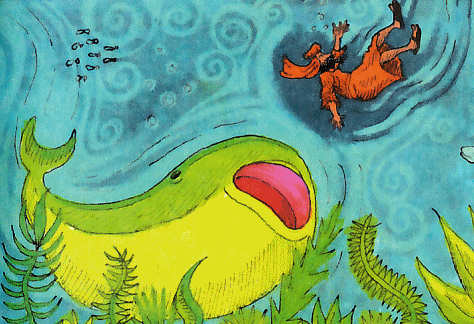
If the story ended there, however, its message would be simple: When the Lord God gives you a commandment, you should follow it. But it is more complicated than that. Jonah does go to Nineveh and he does spread the word about choosing between repentance and doom.
To his chagrin and contrary to the universal experience of prophets, everyone believes him and repents, which is not at all what he expected. And just as he is sitting down to enjoy watching the Lord God knock the place to bits, he realizes that, having repented, it will be spared, just as he feared, which strikes him as no fun at all.
And so in the last chapter the Lord God must instruct his prophet that there is more to prophecy than crying doom upon your enemies and then giggling over their misfortune.
At the end of the text I have added a summary of how modern commentators interpret the story.
The version provided here is from the copyright-free World English Bible. This is the best available copyright-free version. As is usual in scriptures, individual "verses" are numbered. I have retained the chapter and verse numbering, but have increased the number of paragraph breaks to facilitate on-line reading. For a different translation, with useful interpretative notes, check the New American Bible text of this work on the web site of the United States Conference of Catholic Bishops. (Link) For the Book of Jonah in Hebrew, click here.
Chapter 1
The Lord orders Jonah, a prophet, to travel to Nineveh and admonish the people against their sinfulness. Jonah seeks to escape this mission but a storm threatens his ship and he is thrown overboard and devoured by a great fish.
[1] Now the word of the Lord came to Jonah the son of Amittai, saying, [2] “Arise, go to Nineveh, that great city, and proclaim against it, for their wickedness has come up before me.”
[3] But Jonah rose up to flee to Tarshish [in Spain] from the presence of the Lord. He went down to Joppa, and found a ship going to Tarshish; so he paid its fare, and went down into it, to go with them to Tarshish from the presence of the Lord.
[4] But the Lord sent out a great wind on the sea, and there was a mighty storm on the sea, so that the ship was likely to break up.
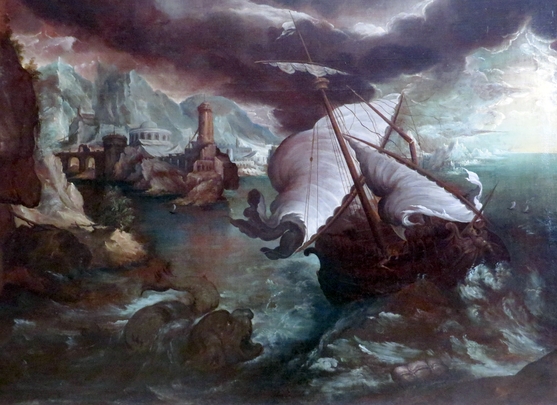
[5] Then the mariners were afraid, and every man cried to his god. They threw the cargo that was in the ship into the sea to lighten the ship. But Jonah had gone down into the innermost parts of the ship, and he was lying down, and was fast asleep. [6] So the shipmaster came to him, and said to him, “What do you mean, sleeper? Arise, call on your God! Maybe your God will notice us, so that we won’t perish.”
[7] They all said to each other, “Come, let us cast lots, that we may know who is responsible for this evil that is on us.” So they cast lots, and the lot fell on Jonah. [8] Then they asked him, “Tell us, please, for whose cause this evil is on us. What is your occupation? Where do you come from? What is your country? Of what people are you?”
[9] He said to them, “I am a Hebrew, and I fear the Lord, the God of heaven, who has made the sea and the dry land.”
[10] Then were the men exceedingly afraid, and said to him, “What is this that you have done?” For the men knew that he was fleeing from the presence of the Lord, because he had told them.
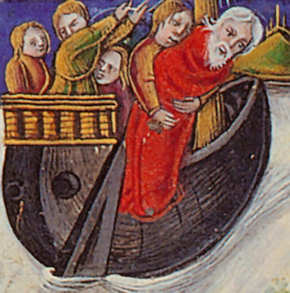
[11] Then they said to him, “What shall we do to you, that the sea may be calm to us?” For the sea grew more and more stormy. [12] He said to them, “Take me up, and throw me into the sea. Then the sea will be calm for you; for I know that because of me this great storm is on you.”
[13] Nevertheless the men rowed hard to get them back to the land; but they could not, for the sea grew more and more stormy against them. [14] Therefore they cried to the Lord, and said, “We beg you, Lord, we beg you, don’t let us die for this man’s life, and don’t lay on us innocent blood; for you, Lord, have done as it pleased you.”
[15] So they took up Jonah, and threw him into the sea; and the sea ceased its raging. [16] Then the men feared the Lord exceedingly; and they offered a sacrifice to the Lord, and made vows.
[17] The Lord prepared a great fish to swallow up Jonah, and Jonah was in the belly of the fish three days and three nights.
Return to top.
Chapter2
In the belly of the fish, Jonah, repentant for resisting God’s mission, prays for deliverance and the fish vomits him up on dry land.
[1] Then Jonah prayed to the Lord, his God, out of the fish’s belly. [2] He said,
“I called because of my affliction to the Lord.
He answered me.
Out of the belly of Sheol I cried.
You heard my voice.
[3] For you threw me into the depths,
in the heart of the seas.
The flood was all around me.
All your waves and your billows passed over me.
[4] I said, ‘I have been banished from your sight;
yet I will look again toward your holy temple.’
[5] The waters surrounded me,
even to the soul.
The deep was around me.
The weeds were wrapped around my head.
[6] I went down to the bottoms of the mountains.
The earth barred me in forever:
yet have you brought up my life from the pit, Lord my God.
[7] “When my soul fainted within me, I remembered the Lord.
My prayer came in to you, into your holy temple.
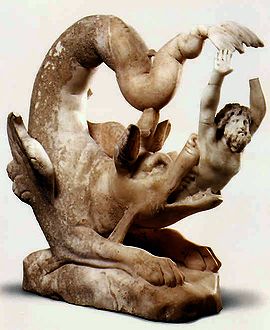
[8] Those who regard lying vanities forsake their own mercy.
[9] But I will sacrifice to you with the voice of thanksgiving.
I will pay that which I have vowed.
Salvation belongs to the Lord.”
This "psalm" is considered by scholars to be a later insertion and not part of the original text. —DKJ
[10] The Lord spoke to the fish, and it vomited out Jonah on the dry land.
Return to top.
Chapter 3
The Lord again commands Jonah to go to Nineveh and tell people to repent or be destroyed by God. Jonah obeys, but anticipates little response. The Ninevites, however, turn from their evil ways and God relents and decides not to destroy them.
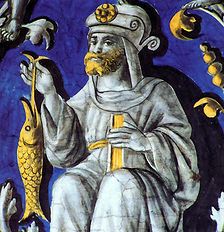
[1] The word of the Lord came to Jonah the second time, saying, [2] “Arise, go to Nineveh, that great city, and proclaim to it the message that I give you.”
[3] So Jonah arose, and went to Nineveh, according to the word of the Lord. Now Nineveh was an exceedingly great city, three days’ journey across. [4] Jonah began to enter into the city a day’s journey, and he cried out, and said, “In forty days, Nineveh will be overthrown!”
[5] The people of Nineveh believed God; and they proclaimed a fast, and put on sackcloth, from their greatest even to their least.
[6] The news reached the king of Nineveh, and he arose from his throne, and took off his royal robe, covered himself with sackcloth, and sat in ashes. [7] He made a proclamation and published through Nineveh by the decree of the king and his nobles, saying,
“Let neither man nor animal, herd nor flock, taste anything; let them not feed, nor drink water; [8] but let them be covered with sackcloth, both man and animal, and let them cry mightily to God. Yes, let them turn everyone from his evil way, and from the violence that is in his hands. [9] Who knows whether God will not turn and relent, and turn away from his fierce anger, so that we might not perish?”
[10] God saw their works, that they turned from their evil way. God relented of the disaster which he said he would do to them, and he didn’t do it.
Return to top.
Chapter 4
Jonah, annoyed at the Ninevites’ seeming repentance, sits upon a hillside to watch their destruction. God explains that the Ninevites will not be destroyed, for they, like Jonah, are his creation.
[1] But it displeased Jonah exceedingly, and he was angry.
[2] He prayed to the Lord, and said, “Please, Lord, wasn’t this what I said when I was still in my own country? Therefore I hurried to flee to Tarshish, for I knew that you are a gracious God, and merciful, slow to anger, and abundant in loving kindness, and you relent of doing harm. [3] Therefore now, Lord, take, I beg you, my life from me; for it is better for me to die than to live.”
[4] The Lord said, “Is it right for you to be angry?”
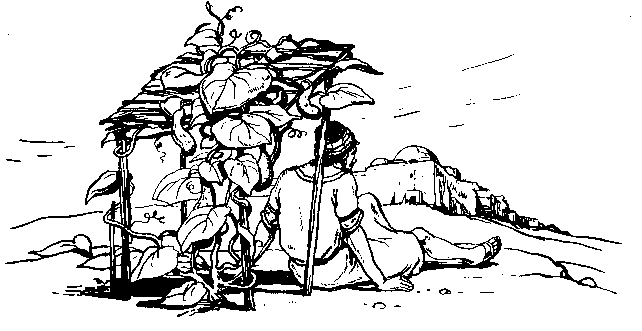
[5] Then Jonah went out of the city, and sat on the east side of the city, and there made himself a booth, and sat under it in the shade, until he might see what would become of the city.
[6] The Lord God prepared a vine, and made it to come up over Jonah, that it might be a shade over his head, to deliver him from his discomfort. So Jonah was exceedingly glad because of the vine.
[7] But God prepared a worm at dawn the next day, and it chewed on the vine, so that it withered. [8] It happened, when the sun arose, that God prepared a sultry east wind; and the sun beat on Jonah’s head, so that he fainted, and requested for himself that he might die, and said, “It is better for me to die than to live.”
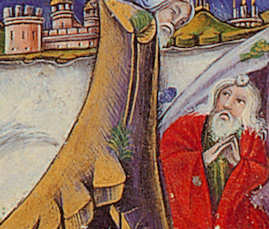
[9] God said to Jonah, “Is it right for you to be angry about the vine?”
He said, “I am right to be angry, even to death.”
[10] The Lord said, “You have been concerned for [i.e., pitied] the vine, for which you have not labored, neither made it grow; which came up in a night, and perished in a night. [11] Shouldn’t I be concerned for Nineveh, that great city, in which are more than one hundred twenty thousand persons who can’t discern between their right hand and their left hand; and also much livestock?”
Return to top.
Modern Interpretations
Most modern commentators agree that the story is humorous and was probably always intended to be, but that it is included in the Bible because through the humor there shine moral lessons —warnings, really— that would have resonated among its intended listeners, living as they did in a world of religious restrictions and stentorian preachments: (1) urging others to follow virtuous ways does not mean you understand the mind of God, and (2) following religious restrictions does not entitle you to self-righteousness.
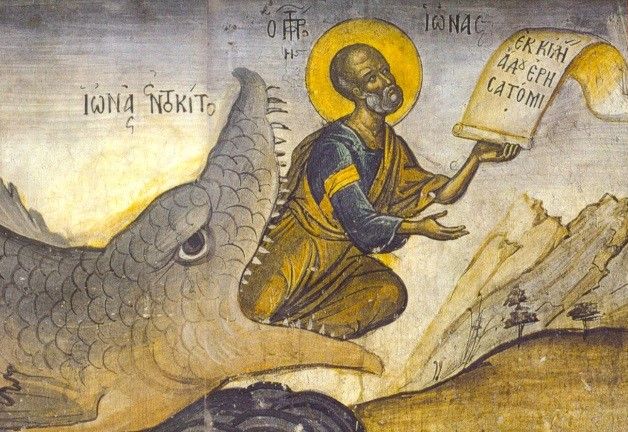
In addition, commentators often point out that the salvation of Nineveh, an Assyrian city and not an Israelite one, underlines the view that the god of the Israelites, sometimes seen as exclusively theirs, can also been understood as universal, concerned not just with Jewish welfare (as seems to be the case in some texts), but with the welfare of all people, even including Israel’s enemies. Seeing God as universal rather than as a patron divinity of only one group in a field of other patron divinities of other groups (even if the others are “false”) is a critical step in the intellectual development of true monotheism.
One scholar writes:
… after the Babylonian Exile, the theocrats of Jerusalem had to deal with a philosophical crisis of faith; they had to reforge a covenant that had apparently been broken when Yahweh allowed the inviolable rights of the Chosen People to be violated by the Babylonians. One can detect a siege mentality developing, a retreat into legalistic moralism, which came to be challenged by the moral individualism of the Hellenistic way of thinking. … The moral of this parable [of Jonah] … is that it expresses an anonymous author's protest against the pernicious exclusiveness of narrow Judaism, claiming the grace of God for themselves and themselves alone. It is the first indication in the Old Testament that Yahweh was the god not just of a select few of mankind, but of all mankind; … (Magnusson 1977: 214).

Historical footnote: In Christian times, the Jonah story was taken as prefiguring the resurrection of Jesus because Jesus was believed to have spent three days and nights in the land of the dead just as Jonah spent that much time in the belly of the fish. For this reason, a depiction of Jonah was sometimes used as a motif on stone coffins like the intricate IVth-century one from the Vatican Museum shown here. At left the sailors throw Jonah overboard into the maw of the "great fish," which, further to the right, vomits him onto dry land. At the upper right he rests under the fig tree resentfully contemplating the reformed citizens of Nineveh at the lower right whom he converted from sin to virtue in the strip across the top. There are medieval legends of what happened to Jonah after the text ends. (If you wish, you can even write your own!)
Return to top.
A review quiz is available for this reading. (Link)
Translation Source:
- The World English Bible
-
The World English Bible is a deliberately copyright-free modern English revision of a 1901 translation that has now passed into the public domain. The ongoing revision of the web version has modified some expressions since the present text was extracted. Most importantly, in the most recent redaction the word here rendered "Lord" is now transcribed "Yahweh" (God's Hebrew name, cognate with English Jehovah).
Interpretive Sources
- ALBIZU, José Luís
- 1982 Figuras biblicas. Madrid: Ediciones Rioduero. P. 125.
- ANDERSON, Bernhard W.
- 1975 Understanding the Old Testament. Third edition. Englewood Cliffs: Prentice Hall. Pp. 564-566.
- da CAPOA, Chiara
- 2003. Old testament figures in art. Los Angeles: J. Paul Getty Museum. Pp. 342-343.
- DERIMAL, Éric
- 2006 Les grands personnages de la bible. Paris: Éditions: First-Gründ. Pp. 107-108.
- MAGNUSSON, Magnus
- 1977 Archaeology of the Bible. New York: Simon & Schuster. Pp. 214.
- PARUZEL, H. & E. WOJTAKOWSKI
- 1975 Biblia vortaro. Ravenna: Internacia Asocio de Bibliistoj k Orientalistoj. P. 478.
- RÉN Jìyù 任继愈 (ed.)
- 1981 Zōngjiào cídiăn. 宗教词典。 Shanghai: Shànghǎi Císhū Chūbǎnshè. 上海辞书出版社。 P. 480.
Picture Sources
- Biblia Borso Estense
- The two medieval pictures are from a Bible owned by the Italian government and kept at the Biblioteca Estense Universitaria, Modeno.
- BRIL, Paul
- 1600 Le naufrage de Jonas. The painting of the storm at sea is by Paul Bril [1564-1526] and hangs in the Musée des Beaux Arts, Lille.
- Buk Baibel
- 1989 Buk Baibel. Port Moresby: Baibel Sosaiti bilong Papua Niugini. P. 1193. (The picture of Jonah under the ramada.)
- SUGGS, Rob
- 1995 The comic book Bible. Uhrichsville, OH: Barbour Publishing. P. 143. (The drawing of the Great Fish.)
- Anonymous
- The sculpture of the unidentified prophet is in the Musée Cluny, Paris.
- Anonymous
- The XVIth-Century fresco of Jonah with a fish on a line is on the ceiling of the Cathédral de Ste Cécile, in Albi, France.
- Anonymous
- The sculpture of the sea monster vomiting up Jonah is in the Cleveland Museum of Art.
- Anonymous
- The "Sarcophagus of Jonah" is in the Pio-Christian Museum of the Vatican Museums.
- Anonymous
- "Jonah As an Orthodox Saint" is from an unknown source.
Return to top.
Background Design: Hebrew Lines From the Book of Jonah









